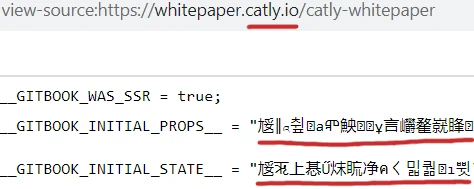Catly Review: CATLY token staking model Ponzi
 Catly fails to provide ownership or executive information on its website.
Catly fails to provide ownership or executive information on its website.
In fact as I write this, Catly’s homepage is nothing more than a sign up/sign in form. An MLM company hiding everything about itself is an instant red-flag.
Catly’s website domain (“catly.io”), was privately registered on March 2nd, 2023.
With a big of rigging around I was able to access Catly’s whitepaper. While there is a “Team and Advisors” section of the whitepaper, no actual information about who’s behind Catly is provided.
In the source-code of Catly’s whitepaper we find Chinese:

While not definitive, this suggests whoever is running Catly has ties to China, Singapore and/or Malaysia.
Of note is there seems to be some manipulation going on with Catly’s recorded website traffic.
SimilarWeb tracked just 89,200 visits to Catly’s website in April 2023. This jumped to a whopping 6.8 million in May and even higher to 9.8 million in June.
This is highly unusual for a new web property and suggests artificial traffic was used.
Nonetheless, as of June 2023 SimilarWeb tracked top sources of traffic to Catly’s website as Russia (24%), Ukraine (15%0 and Indonesia (11%).
The Central Bank of Russia is pretty quick to issue securities fraud warnings for scams targeting Russia. If ~2.5 million visits to Catly’s website originated from Russia last month, it’d probably have appeared on their radar.
This reaffirms Catly is likely manipulating its website traffic data.
It also introduces the possibility of Russian scammers running Catly, having engaged Chinese developers to put together its site.
As always, if an MLM company is not openly upfront about who is running or owns it, think long and hard about joining and/or handing over any money.
Catly’s Products
Catly has no retailable products or services.
Affiliates are only able to market Catly affiliate membership itself.
Catly’s Compensation Plan
Catly affiliates invest tether for for CATLY tokens. Pricing isn’t provided but one marketing example I saw equated 1 USDT to 250 CATLY.
Once invested in, CATLY is parked with the company on the promise of a daily 3% ROI (staking).
Catly’s “staking” investment plan runs for 15 days, during which staked CATLY is locked.
Over the 15 days the daily ROI can be cashed out. After 15 days the original CATLY investment amount is unlocked.
Catly pays referral commissions via a unilevel compensation structure.
A unilevel compensation structure places an affiliate at the top of a unilevel team, with every personally recruited affiliate placed directly under them (level 1):

If any level 1 affiliates recruit new affiliates, they are placed on level 2 of the original affiliate’s unilevel team.
If any level 2 affiliates recruit new affiliates, they are placed on level 3 and so on and so forth down a theoretical infinite number of levels.
Catly caps referral commissions down ten unilevel team levels.
Referral commissions are paid as a percentage of tether deposited in across these ten levels as follows:
- level 1 (personally recruited affiliates) – 3.5%
- level 2 – 1.8%
- level 3 – 1.6%
- level 4 – 1.4%
- level 5 – 1.2%
- level 6 – 1%
- level 7 – 0.8%
- level 8 – 0.4%
- level 9 – 0.2%
- level 10 – 0.1%
Joining Catly
Catly affiliate membership is free.
Full participation in the attached income opportunity requires investment in CATLY tokens.
Catly solicits investment in tether.
Catly Conclusion
Catly is a simple “staking” model Ponzi scheme, built around its CATLY token.
CATLY is a BEP-20 token, created on the Binance Smart Chain. BEP-20 tokens can be created in a few minutes at little to no cost.
New investors deposit tether for CATLY. CATLY is then fed into Catly’s staking investment scheme, which generates more CATLY.
The goal is to cash out other people’s tether, making CATLY a Ponzi scheme.
At a minimum Catly provides no evidence it has registered its investment scheme with financial regulators.
Instead Catly offers up this nonsense;
Compliance Requirements
CATLY will adhere to local laws and regulations and maintain close cooperation with regulatory authorities. We have obtained the US MSB (Money Services Business) license and US Foundation license to ensure platform compliance and mitigate potential fraud and money laundering activities.
“US MSB” appears to refer to FINCEN. No idea what a “US Foundation license is”.
Regardless, these are not financial regulatory registrations. For the purpose of MLM due-diligence, FINCEN registration is meaningless.
As with all MLM Ponzi schemes, once affiliate recruitment dries up so too will new investment.
This will starve CATLY of ROI revenue, eventually prompting a collapse.
Currently, CATLY is worthless outside of Catly itself. When the time comes, Catly plans to exit-scam by dumping CATLY on dodgy exchanges.
Once 70% of the $CATLY tokens are minted, our focus will shift towards seeking listings on reputable cryptocurrency exchanges.
Realistically at 3% a day, it’s more likely Catly will just exit-scam by disappearing.
Either way the math behind Ponzi schemes guarantees that when they inevitably collapse, the majority of participants lose money.
Update 19th August 2023 – Catly has collapsed.


I dunno, Oz. That looks like Mojibake to me. Maybe run it through Mojibake decoder?
Further inspection shows that the website developer used a documentation viewer known as “gitbook” (indeed it’s stated in the lowerleft), and those mojibake text are just variables encoded into a text string.
They are irrelevant. I don’t see anything linking to the real devs.
Now, if you view-source: catly.io/mobile/#/
You’ll see it refers to Baidustat, which is a visitor counter for Baidu, similar to Google’s SEO console.
So I agree the developer is likely Chinese or familiar with Chinese.
TIL Mojibake is a thing. I did note the random characters but figured that was just some GitBook encoding thing (I know it’s a platform thing you can run locally to create a project you can then upload somewhere I think).
The characters I punched into translator came back Chinese (simplified). So I figured that meant the host machine was Chinese language.
Didn’t spot the additional Baidu fingerprint, good catch.
The mistake many writers are making is because they are not investors but writers.
They think 3% DAILY is not sustainable.
First note that you buy at 0.0025 and sell at 0.0033.
Therefore if you invest $100 for 30 days you assume you earn $90 which is not so.
To cash out your $100 which is 100 ×250 catly: 25,000 catly is cash out @ 25,000÷300=$83.3
And your $90 which is 22,500 is cash out at 22500÷300 which is $75.
83+75=158 you have made $58 in a month which is not too bad in crypto world.
Further calculation reveals this to be 1.9% daily which is in the range of what most cryptos pay.
1.9% in crypto work is feasible and is sustainable.
The same thing applies to the referral.
Catly is sustainable and is not ponzi scheme.
I have more details to prove to the World that Catly coin is a sustainable innovation.
Math is math, regardless of whether you’re investing in Ponzi schemes or not.
You’re argument is basically “this is believable so Catly isn’t a Ponzi scheme.
Catly is a Ponzi scheme because newly invested funds to pay withdrawals. Math guarantees this is unsustainable and will inevitably collapse.
The only proof that counts is proof of registration with regulators and filed audited financial reports.
Which you don’t have, because Catly is committing securities fraud. Why? Because it’s a Ponzi scheme.
Sorry for your loss.
I’ve not lost anything in catly and will not.
Are you saying that using bolt and AI investing company cannot pay 1.7% daily? Which fraud and where.
Catly with its buy back is innovative and unique.
If Catly is not doing pay back people will call it scam and that they will run away with your money but now they are doing pay back which is not mandatory, people still say is ponzi scheme.
Is not compulsory for you to do buy back during the sales period, is optional.
To me it seems once innovation is not from some sources then is scam or ponzi.
They just like to call dog bad name so as to hang it.
$Catly will survive, continue setting on the fence and call it ponzi.
Except you have already lost money and will continue to lose them if you invest more. Sorry for your loss.
Yes, indeed. This concept is logically flawed. Those who are able to legitimately generate such profits do not give away access to this goldmine for free.
Except that Ponzi schemes are not really innovative and unique.
Well… maybe because it is a Ponzi scheme, no matter whether it pays now or not. All Ponzis pay out money until their admins have stolen enough.
I’m saying Catly is committing securities fraud because it’s a Ponzi scheme. There is no “bolt” or AI.
First MLM crypto Ponzi? Sorry for your loss.
You exchange $100 for 250 and you decide to sell it (Ozedit: snip, see below)
Sell to who? Who the fuck is buying yet another cookie-cutter worthless Ponzi coin?
Catly is using invested funds to cover withdrawals, same as any other Ponzi.
You also talk of traffic manipulation. Do the calculation yourself when you have 100 000 traffic (Ozedit: snip, see below)
Hypotheticals = GTFO.
You see Catly’s website traffic manipulation on SimilarWeb. New Ponzi site goes from no visits to 9 million to 12 million a month.
This is obviously bullshit. GG scammers.
Which investment fund and what do other people use? (Ozedit: derails removed)
Derails = spambin. First and last warning.
The way I see catly appears in two ways both Ponzi and legit (Ozedit: snip, see below)
Ponzi schemes by definition are fraudulent. There’s no such this as a “legit” Ponzi scheme.
Stop making excuses for scammers.
Hmmm… Those who joined early and have cashed out should be wise not to invest more.. because definitely it will collapse with time..
People need to see these kinds of posts. Ponzi always looks legitimate with a good pay too but there are always visible loopholes.
I have been reading comments and it pained me that I just stumbled on this. Catly finally halted buyback and funds are locked.
I invested $200. What a pity. Most people praising catly won’t come back here to say this.
Thanks for the update, confirmed.
And yes, Ponzi shills like Adadis Web rarely return for a serving of humble pie.
People who invest in Ponzi schemes are not investors. The ones who pull out and build big teams ( recruiters) are the only ones , below the owners who make ” profits’ . The rest of the “investors ” are called victims because they are unable to withdraw their “investments”
let me cry,I lost my investment thank you for your comments I really appreciate.